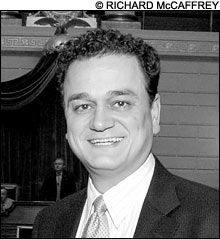This was supposed to be the year.With the election of Governor Lincoln Chafee and the rise of openly gay Speaker of the House Gordon Fox, Rhode Island was finally poised to join its New England neighbors in legalizing same-sex marriage.
But then, last week, a lightning bolt from the speaker's office: the votes just aren't there, Fox said; he would abandon the gay nuptials bill and seek a consolation prize — civil unions — instead.
Advocates were livid.
"I was shocked," says Karen Loewy, a senior staff attorney with Gay & Lesbian Advocates & Defenders (GLAD). "Those of us who have devoted insane amounts of time trying to move a same-sex marriage bill forward were blindsided."
A week later, the shock is starting to wear off. And as a new reality comes into focus, same-sex marriage supporters are staring down two critical, interrelated questions: What happened? And what now?
WHAT HAPPENED?
Fox — who is, by all accounts, anguished over the demise of the bill — offers a sort of realpolitik explanation for his decision: opposition in the state Senate was simply too strong and he was unwilling to subject House members to a vote on a controversial measure destined to fail.
Advocates insist the bill could have passed the House. And getting the bill through that chamber, they argue, was a necessary precondition to building the case in the Senate.
Only then, same-sex marriage proponents say, could they have forced senators to engage with the issue in a real way. Only then could they have turned the upper house into a real battleground.
But even advocates acknowledge that the opposition in the Senate was real — and went beyond Senate President M. Teresa Paiva Weed, a pivotal figure who has been clear about her personal objections.
In the end, the Senate's resistance might have doomed even the savviest of same-sex marriage campaigns. But the gay nuptials push, it is clear, was a flawed enterprise.
In the House itself, the progressive wing of the Democratic Party clearly suffered from the loss of a group of young, experienced state representatives with strong organizing skills.

ANGUISHED Fox. |
Among that cohort: state Representative Chris Fierro, a Woonsocket Democrat who lost his re-election bid last fall and representatives Ray Sullivan, David Segal, and Ed Pacheco, who left the chamber of their own accord last year.But if the inside game was lacking, the outside game was problematic, too. Marriage Equality Rhode Island (MERI), the main advocacy group, was riven by internal conflict and stumbled badly in the early going.
Much of the critique has focused on Kathy Kushnir, the former executive director, who resigned last week.
Some insiders maintain she was in an impossible position — destined to be blamed, no matter what she did, for MERI's frustrated progress. But there was broad concern that Kushnir, who did not respond to a call for comment, lacked the campaign experience required for the final legislative push.
Indeed, MERI's grassroots effort grew far more sophisticated after the late-February installation of Sullivan, one of the young state representatives who left the House last year, as campaign director. That effort, though, proved too little, too late.